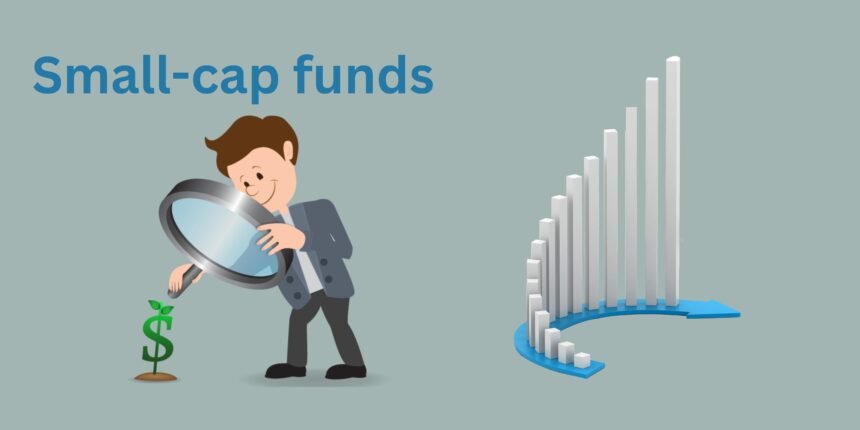A small-cap fund is one kind of mutual fund as well as an exchange-traded fund (ETF) that mainly invests in stocks of small-capitalization companies. These are firms with moderately low market capitalizations, usually ranging from $300 million to $2 billion. Small-cap funds desire to exploit the potential for growth of these smaller businesses, which are generally in their early stages and thus have the ability to expand substantially and become profitable.
Small-cap funds expose investors to higher risks compared to mid-cap or large-cap funds since they experience volatility characterized by greater price swings in small-cap stocks. Nevertheless, they also present the possibility of making more money than expected because smaller companies grow faster than bigger firms. Clients investing in small caps must be ready for this increased risk level and have a longer timeframe before they realize their investments.
These portfolios are managed by professional portfolio managers who select from different sources, including factors such as capital structure, earnings prospects, or position, among others. Such diversification could reduce risks associated with individual investments in a single stock.
What is a small-cap fund?
A small-cap fund is a type of mutual fund or exchange-traded fund (ETF) that invests primarily in the stocks of small-capitalization companies. These are companies with a relatively small market capitalization, typically between $300 million and $2 billion. Small-cap funds aim to capitalize on the growth potential of these smaller companies, which are often in their early stages of development and may have significant room for expansion and profitability.
Small-cap funds are considered to be at higher risk compared to large-cap or mid-cap funds due to the volatility and potential for greater price swings in small-cap stocks. However, they also offer the potential for higher returns, as small companies can grow more rapidly than larger, more established firms. Investors in small-cap funds should be prepared for this higher level of risk and have a long-term investment horizon to weather the ups and downs of the market.
These funds are managed by professional portfolio managers who select a diverse range of small-cap stocks based on various criteria, such as the company’s growth prospects, financial health, and market position. This diversification helps to mitigate some of the risks associated with investing in individual small-cap stocks.
Certain investors may find small-cap funds to be a viable alternative, but it all depends on your investing timeframe, risk tolerance, and financial goals. Here are some things to think about:
- Higher Growth Potential: Compared to larger, more established businesses, small-cap firms frequently have greater space for expansion. If small-cap companies do well and their stock price rises, investing in these funds may yield larger profits in the long run.
- Higher Risk and Volatility: Compared to large-cap equities, small-cap stocks are typically more volatile and subject to greater market swings. Your investment portfolio may experience greater gains or losses as a result of this volatility.
- Diversification: It can be achieved by including small-cap funds in your investment portfolio. Small-cap stocks offer a hedge against market downturns because they do not necessarily go in the same direction as large-cap stocks or other asset classes.
- Long-Term Horizon: For investors with a long-term investment horizon (5–10 years), small-cap funds are frequently advised. This gives smaller businesses more time to realize their growth potential and recover from transient turbulence.
- Investment plan: Take into account your asset allocation and overall investment plan. Generally speaking, small-cap funds belong in a diversified portfolio together with bonds, large-cap stocks, and other asset classes.
It’s crucial to learn about the goals, management, expenses, and past performance of small-cap funds before investing.
Are small-cap funds a good investment?
Small-cap funds can be a good investment for those seeking higher growth potential and willing to accept increased volatility and risk. They offer opportunities for significant returns due to the growth prospects of smaller companies, but they can also be more volatile and less liquid. Best suited for long-term investors with a high-risk tolerance, small-cap funds can enhance portfolio diversification when included as part of a broader investment strategy.
Is it risky to invest in small-cap funds?
Yes, investing in small-cap funds is generally riskier due to their higher volatility, lower liquidity, and greater susceptibility to market downturns. However, they also offer higher growth potential, making them suitable for long-term investors with a high-risk tolerance.
Is Kotak’s small-cap fund good?
Kotak’s small-cap fund is considered good by many investors due to its strong performance and skilled management. However, as with any investment, it’s important to review its recent performance, fees, and how it fits with your risk tolerance and financial goals before investing.
Which cap is best for a sip?
For a systematic investment plan (SIP), large-cap and multi-cap funds are generally considered best. Large-cap funds offer stability and steady growth, while multi-cap funds provide diversification across different market capitalizations, balancing risk and return.
Is a small cap good for 20 years?
Yes, small-cap funds can be a good investment for a 20-year period. Over the long term, they have the potential for high growth, although they come with higher volatility. With a long investment horizon, you can ride out market fluctuations and benefit from the growth of smaller companies.
Is the HDFC small-cap fund good?
The HDFC Small Cap Fund is generally well-regarded due to its strong historical performance and experienced management. However, as with any investment, you should review its recent performance, fees, and how it aligns with your risk tolerance and financial goals before investing.
Which SIP is best for 5 years?
For a 5-year SIP, balanced or hybrid funds are often considered the best option. These funds invest in a mix of equity and debt, offering a balance between growth and stability. Additionally, large-cap equity funds can be suitable for moderate risk with the potential for steady returns. Always consider your risk tolerance and investment goals when choosing a SIP.
